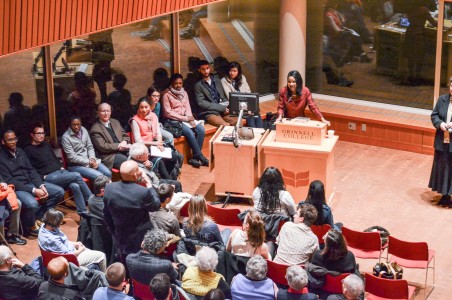On Monday, Jan. 20, Pulitzer Prize-winning journalist Isabel Wilkerson came to Grinnell to celebrate Martin Luther King, Jr. Day and discuss her 2010 book, “The Warmth of Other Suns: The Epic Story of America’s Great Migration.”
Wilkerson is a journalist at the New York Times and the first African-American woman to win a Pulitzer Prize, which she received in 1994 for her profile of a fourth grader from Chicago’s South Side and her coverage of the 1993 Midwestern floods.
“The Warmth of Other Suns” was inspired by the six million people who moved away from oppressive life in the South and traveled to the North during the Great Migration, which lasted from the early to mid-twentieth century and was one of the largest internal migrations in the United States.
Although the United States has experienced many migrations throughout its history, Wilkerson specifically stressed how these people sought to oppose a caste system that denied them citizenship when they had every right to claim it.
The tremendous oppression that these people felt was present in their everyday lives, but never was its injustice made clearer than when they had to face a court trial, she said, as African-Americans and white Americans were made to swear to different Bibles.
“Even the word of God was segregated,” Wilkerson said.

After a short silence, Wilkerson told the audience that one of the things that impressed her the most when lecturing high school students about her book was that they were so “beautifully removed” from the kind of oppressing pressure that had been experienced by so many others right before and during the Great Migration.
She said part of her objective in writing “The Warmth of Other Suns” was to make this part of history come alive.
Some who attended the lecture enjoyed the subject matter, but thought that the speech itself would have been more appropriate for a younger audience.
“I thought her talk may have been geared towards middle school or high school students,” said Geo Gomez ’15. “She mentioned a lot of names continuously, and it seemed like one of those talks that went, ‘You too can do it!’ which seemed more inspirational for a younger, not necessarily our, audience.”
Other audience members said they wished the speaker had focused more on the book itself and its characters, as well as what made her decide to write it.
Wilkerson stressed that the movement demonstrated how far people were willing to go in search of freedom and improve their condition of life. In many ways, she said, it planted the seeds of the civil rights movement.
Whatever they felt about the substance of the lecture, the audience agreed that the spirit of freedom and opportunity that Wilkerson described was admirable.
“I enjoyed how she continuously related the themes of her novel to something that was not an experience specific to one group of people. I like how she related the experiences of the people in her book as an American experience,” Gomez said.



















































